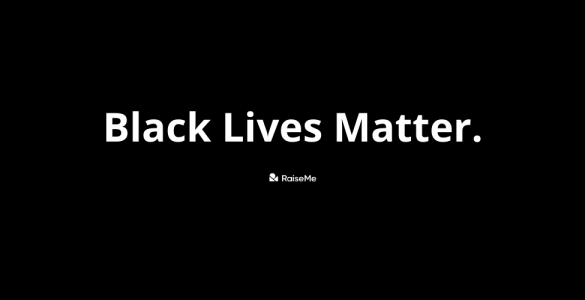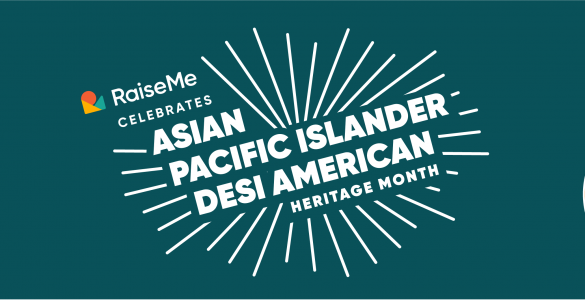Hack Week 2019: Project Golden Gate
In RaiseMe’s inaugural hack week, one team took on improving data delivery methods from RaiseMe databases to college’s CRMs. Building that bridge became the inspiration for the project name. Introducing Project Golden Gate.
Hey Internet,
I’m Wayne, and a key part of my role is understanding each of our 330+ college and university partners’ internal processes and determine how RaiseMe’s product can both complement and evolve their admission and financial aid strategies.
Here at RaiseMe, we do this by living up to one of our company values of Being a Scientist. Critical to our practice is developing a virtuous loop of feedback with our end users, ranging from admission counselors to Deans of Admission. Our teams, from Partnerships to Engineering, always seek to approach our work in this scientific and empathetic manner to ensure our product meaningfully serves our college partners and, ultimately, the students we both serve.
The Team and Who We Hacked/Built For:
RaiseMe’s Hack Week served as an opportunity for Team Golden Gate to focus on helping a key end user: college and university data operators. Imagine these folks as air-traffic control of enrollment offices: managing multiple data streams into the institution’s CRM, ensuring fidelity of data while building out actionable platforms for marketing teams to generate successful drip campaigns, and enabling admission officers to be more analytical in their recruitment efforts.
If you’re reading this and know someone who matches that description, go buy these unsung heroes a cup of coffee. They make the magic happen.
Team Golden Gate consisted of members from different RaiseMe teams: Partnerships, Business Development, and Engineering. Some of us are based in San Francisco, depicted below, and other team members based in Southern California and the Midwest.
 Team Golden Gate (Left to right): Myself (Partnerships), Andrew (Engineering), Rajesh (Engineering), and Sean (Engineering); Not pictured: Laura (Business Development), Miles (Partnerships), Matt (Partnerships), Isha, (Partnerships), Katie (Partnerships)
Team Golden Gate (Left to right): Myself (Partnerships), Andrew (Engineering), Rajesh (Engineering), and Sean (Engineering); Not pictured: Laura (Business Development), Miles (Partnerships), Matt (Partnerships), Isha, (Partnerships), Katie (Partnerships)
Why the team name “Golden Gate?” We wanted a purposeful project name representing the bridge we are building between RaiseMe and our college end users by improving data delivery methods from our databases to their CRMs.
Periodically, in the past few months, there were challenges in this process that affected data operators: from downloading errors to delays in loading the College Portal. We dove in with the hope of more deeply understanding data systems-oriented users and to identify and alleviate friction points in their RaiseMe experience. Based on preliminary user interviews and conversations across teams, we determined that our work with this group of users would address two problems that are worth solving:
- How might we eliminate the friction our data operators encounter in downloading RaiseMe data and uploading it into their CRM?
- How might our Partner Success team determine if a college partner is uploading the most beneficial RaiseMe fields into their CRM?
We came in with an assumption that a direct API integration with our college partners’ CRMs would solve the two challenges above. And so, off we went on Monday.
Spoiler: Come Wednesday, that assumption was as durable as cotton candy in a rainstorm.
Testing Assumptions by Exploring Needs & Solutions with Clients:
After internally identifying five RaiseMe partners who we either spoke to about new delivery possibilities in the past, or partners who really leaned into our product, the Partner Success Managers introduced those partners to our team. We dove into User Research mode, seeking to better understand partners’ business processes, systems and data architectures, the challenges teams encountered with our product, as well as challenges and best practices in integrating with other vendors. We then presented our API-integration hypothesis.
During Tuesday’s calls, two of three partners saw the API-integration approach as a potential solution to address existing data operation challenges. They were excited to collaborate on it. Internally, we were feeling very confident in our direction. This was despite our recognition that one trusted partner underlined that this wasn’t the best direction to take for a number of insightful reasons. That evening, after internal deliberations, we began developing an integration pilot using CRM-provided REST APIs.
On Wednesday, we came into the first partner call feeling very confident about our solution. However, that confidence went from a strong sense of certainty to… “oh.” Both of Wednesday’s interviews indicated that an API-level integration would not solve what we determined to be the primary friction points.
/INSERTperson_in_the_rain_holding_sad_and_wet_paper_cone_with_residual_cotton_candy.gif
We discovered that most partners leveraged existing middleware tools to move data into their CRMs which standardize and map data from multiple vendors, including RaiseMe. Not only do our partners have multi-year commitments to these tools and rely on them for an abundance of input processes (e.g., managing imports, de-duplication, etc.), but they also ensure there is a human-check on data, which ensures functional, secure, and accurate integration with time-bound actions (e.g., triggered communication). It is simpler for partners to leverage a unified data ingestion mechanism than to adopt unique approaches for each source of data. Non-standard approaches become a major obstacle to adoption. It became clear to RaiseMe that an API-level integration approach wasn’t viable for these reasons.
 #MidWeekMood #UserResearch
#MidWeekMood #UserResearch
Realizations & the Pivot:
In reflection, as with many product journeys, we sought to validate an idea as opposed to seeking to understand our users and their challenges. Sometimes, proposing an idea that isn’t well received teaches us all. This was, and still is, a lesson that we continue to reflect on: how might RaiseMe, across teams, better engage users to validate our assumptions and bring these insights into our product roadmaps? It will never be a clear-cut process, especially as we innovate with our users. Nonetheless, we persist.
Wednesday at 3:34PM PST was the moment when we realized that we must pivot in order to achieve our mission. We reviewed each of the calls, via our notes and interview recordings, and then reconvened as a group. We all agreed that an API-level integration was not the best approach for our users and we refocused on what our users wanted to accomplish.
A sentiment expressed by each of our 5 user interviewees was that data operators wanted to get RaiseMe data in a “CRM ready” state. After manually downloading from our portal, there were still steps that required time and attention for these users who were handling multiple streams of data.
We collectively realized, from our user interviews, that RaiseMe can and will help. We proceeded to build a basic example of our recommendation, then looped back with our interviewees, who provided positive feedback on the feature. One user even indicated that it would decrease the time needed to download, clean, map, and upload into their CRM from 15 minutes to 2 minutes. Across the board, such a feature could save our 330+ partners 3,500 hours annually. #ROI
Scheduled Templates:
Through our user research and willingness to stress-test our assumptions with our users, we determined that Scheduled Templates would be a strong first step in addressing the two problem statements mentioned earlier:
- How might we eliminate friction our data operators encounter in downloading RaiseMe data & uploading it into their CRM?
- How might our Partner Success team determine if a college partner is uploading the most beneficial RaiseMe fields into their CRM?
End users would be able to develop customized templates to generate reports on a self-determined frequency with custom field mappings and notifications. Not only would this enable institutions to personalize their data downloads to their CRM setup and enrollment marketing campaigns, but it also ensures each file has a standard layout. Our Partner Success Managers could better track what fields their college partners were capturing as part of their CRM integrations so as to enable proactive coaching on best practices and strategies.
During the presentations in front of the company and judges, we enjoyed bringing to light the data operator’s current experience, our team’s journey through user interviews, subsequent pivot, and building the case to the company and judges that this was an idea worth pursuing. We were excited and thankful to judges and the RaiseMe team for voting Project Golden Gate runner up for both People’s Choice and Judges’ Choice. This feature is still TBD for the company’s 2020 Product Roadmap, but stay tuned!
Upon reflection:
A few lessons came from the week of hacking.
- It was a great experience being able to work across different business units and to bring the strengths of our remote team to the project. For some, this was the first time working cross-functionally or speaking to this specific end user. All of us brought our expertise to the table and were willing to challenge each other to stress-test a concept that serves our users.
- In the beginning stages of our project, we sought to validate an idea as opposed to seeking to understand our users and their challenges. We hope to continue developing methods and processes to better listen to our users and to incorporate these stories & observations into our product roadmap.
- Our end users from the college partner side are excited to continue leaning into discussions around their current experience. We realize that many of our 330+ college partners currently find ways to stretch our product and develop workarounds for existing inefficiencies. Our team has the ability to develop empathy, listen, and consider how we might change that for the better.
Special thanks:
- To our partners at Wingate University, Saint Leo University, Syracuse University, Saint Louis University, and University of Northern Iowa. Your time, ability to voice your experience, and existing processes made this project possible and we’ll continue advocating for you.
- To the company and judges, thanks for voting for the project!
- And the whole Golden Gate Team, y’all rock.
Stay tuned for future developments on this project! Now I’m off to get some well-deserved cotton candy.
Warmly,
Wayne Kim
Want to learn more about working at RaiseMe? Check out our jobs page.
You may also like

Our commitment to racial justice: a statement from RaiseMe’s Co-Founder and CEO
Racism, police brutality, and violence have no place in our society. Read more about our commitment to eradicating racial...

Get Inspired: Celebrating Artists for Asian Pacific Islander Desi American History Month
Get inspired by these artists for Asian Pacific Islander Desi American History Month!

Celebrating Asian American and Pacific Islander Heritage Month
RaiseMe is taking a step back during the month of May to explore and celebrate the diverse experiences amongst Asian American and Pacific Islanders.
